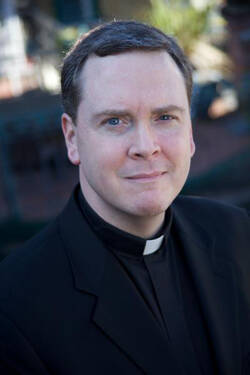Thurston N. Davis, S.J., America’s editor in chief from 1955 to 1968, once described this review as “a weekly raid on the City of God in order to publish, in the City of Man, a journal that talks common Christian sense about the world of human events.” Father Davis would have been the first to admit that this self-understanding sounds a bit pretentious. But he was onto something, an insight that a Christian ministry like ours ought to keep in mind always: The journey from the City of Man to the City of God, as Father Davis said, “is the path marked out for all mortal viatores.”
The one problem with this way of thinking, as William T. Cavanaugh and other theologians have noted, is that it lends itself too easily to a strictly spatial conception of the two cities. Yet Augustine of Hippo, the fifth-century saint who bequeathed to us this doctrine of the two cities, had something different in mind. The distinction between the two cities is “not between two organizations, but two states of mind,” as Richard Price has written.
The boundaries of the cities do not neatly correspond to the distinction between the visible church and the world: “When St. Augustine speaks of a city,” wrote Étienne Gilson, “it is in a figurative sense, or, as he himself states, a mystical sense that he does so.” As a mystical body, then, the City of God transcends space and time. As a sacrament and the visible sign of the City of God, the church also transcends space and time.
This was much on my mind as I travelled last week between two other cities, New York and Kansas City, Mo., in order to attend two very different events. In New York I attended the annual Erasmus Lecture, given by Archbishop Charles Chaput, O.F.M. Cap., of Philadelphia and hosted by First Things, the journal of opinion founded by the late Rev. Richard John Neuhaus. In Kansas City I visited The National Catholic Reporter, the lay-led newspaper that is celebrating its 50th anniversary this year.
At first glance, it might be difficult to see what these two events had in common. But one could make that mistake only if one understood the City of God in strictly spatial terms. In that case, it would indeed be hard to see how two groups who so often disagree with one another could share the same space.
But what the two ultimately have in common is not an idea or a platform but a communion of hearts. This communion among the Catholic members of both groups is not a union of their hearts with one another as much as it is a union of their hearts with Christ, the sole source of our unity as a church.
Some people think that talking this way minimizes real and important disagreements. In fact, it makes disagreement and argument possible, for a real argument requires freedom of minds and hearts. When we remember that the sole source of our unity is not the rightness or wrongness of our ideas but our devotion to a person, then we are more free to disagree with one another, precisely because we are more free to be wrong. Our conversation then becomes an encounter rather than a mere confrontation. While we may sound different notes, if we listen closely enough we can hear a certain harmony.
Father Davis completed his self-described pilgrimage from the City of Man to the City of God in 1986. He was reading that week’s letters to the editor when his heart gave out. It’s unlikely that it was something he read. It wasn’t someone else’s opinion that killed him; it was simply his time to go home. Father Davis’s heart was always fixed there, on his true home. That alone made him one of the freest and fiercest intellectuals of his time.








